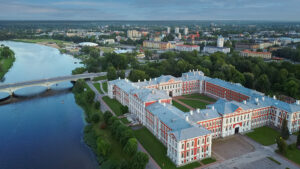Fortum inaugurates €70m biomass plant in Jelgava, Latvia

The new plant will provide district heating to the residents and businesses in Jelgava as well as electricity to the electricity market. The new plant covers approximately 85% of the city’s district heating demand, and saw a €70 million investment from Fortum.
Fortum’s new power plant uses wood chips as fuel and replaces old natural gas-fired heat production in Jelgava, thereby reducing the area’s CO2 emissions by approximately 44,000 tonnes compared to year 2010, the company said.
The production capacity of Jelgava power plant is 23 MW electricity and 45 MW heat.
The plant will produce approximately 110 GWh of electricity and 230 GWh of heat per year. The technology at the plant provides the possibility to use also other solid renewables, like peat and wood residues.
Construction of the plant started in August 2011 and has taken about 570,000 working hours to complete. .
“Residents of Jelgava, who will receive these daily services, are the winners of this long-term cooperation between countries in the energy sector. The cooperation in constructing the plant has been mutually beneficial and based on good partnership for all parties involved. Our common task is to take full advantage of available renewable energy resources as well as the knowledge and technologies of our partners,” said Bērziņš.
“Combined heat and power production is one of the cornerstones of Fortum’s strategy. This production form is energy and cost efficient and together with renewable fuels it is CO2-free,” said Fortum’s CFO Markus Rauramo.
“The simultaneous construction of an identical bio-CHP plant in Järvenpää, Finland, has enabled efficient use of resources and knowledge and ensured the availability of the most modern energy technology in Jelgava.”


















